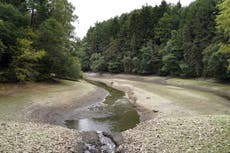Human ancestors possibly drove turtles to extinction millions of years ago
Many turtles still face the threat of extinction today
Turtles are some of the oldest living creatures on the planet, around since the age of the dinosaurs.
But when the ancestors of modern humans started showing up in the evolutionary tree, this ancient group of animals may have started to disappear, a new study has suggested.
The authors found that turtles have seen higher rates of extinction for the past few million years. And based on the timing and locations of these extinctions, they could very likely be linked to the arrival of early humans, the study, which has not yet been peer-reviewed, concluded.
The researchers studied the fossil record of turtles from around the world, noting periods when a lot of species seemed to be going extinct.
The first extinction wave took place while dinosaurs were still around and the second took place around the same time that the dinosaurs (excluding birds) went extinct, nearly 70 million years ago.
For a long time afterwards, turtles prospered — while some species came and went, the extinction rate was generally lower. But around five million years ago, a lot of turtle species started to go extinct again.
The pattern of these extinctions is what led the authors to surmise that they could have been caused by the ancestors of modern humans. For one, the extinction peak started with turtles in Eurasia and Africa — and the early humans had not yet made it to the Americas at that point.
This extinction was also more limited to land-based turtles than those who lived in freshwater. The authors noted that hunting freshwater species would have been more difficult.
This study added fuel to some of the scientific debate on the driving force behind extinctions in the past few million years. Some scientists have suggested that plenty of other ancient animals, like woolly mammoths, have also gone extinct due to humans.
Others have argued that natural variations in Earth’s climate (unrelated to the modern climate crisis) drove species like mammoths to their end.
Either way, many species around today face the threat of extinction, both directly from human influence and from the ramifications of the climate crisis — what some have called the “sixth great extinction”.
That includes turtles. Over half of the hundreds of different turtle species alive today face the threat of extinction, a 2020 study found.
Threatened turtles today include species as diverse as the desert tortoise, native to dry deserts in the US and Mexico, and the Malaysian giant turtle, a freshwater species from southeast Asia.
Both species are listed as “critically endangered”, the highest risk level, by the International Union for Conservation of Nature, a leading analyst of extinction risk.
Join our commenting forum
Join thought-provoking conversations, follow other Independent readers and see their replies
Comments


Bookmark popover
Removed from bookmarks